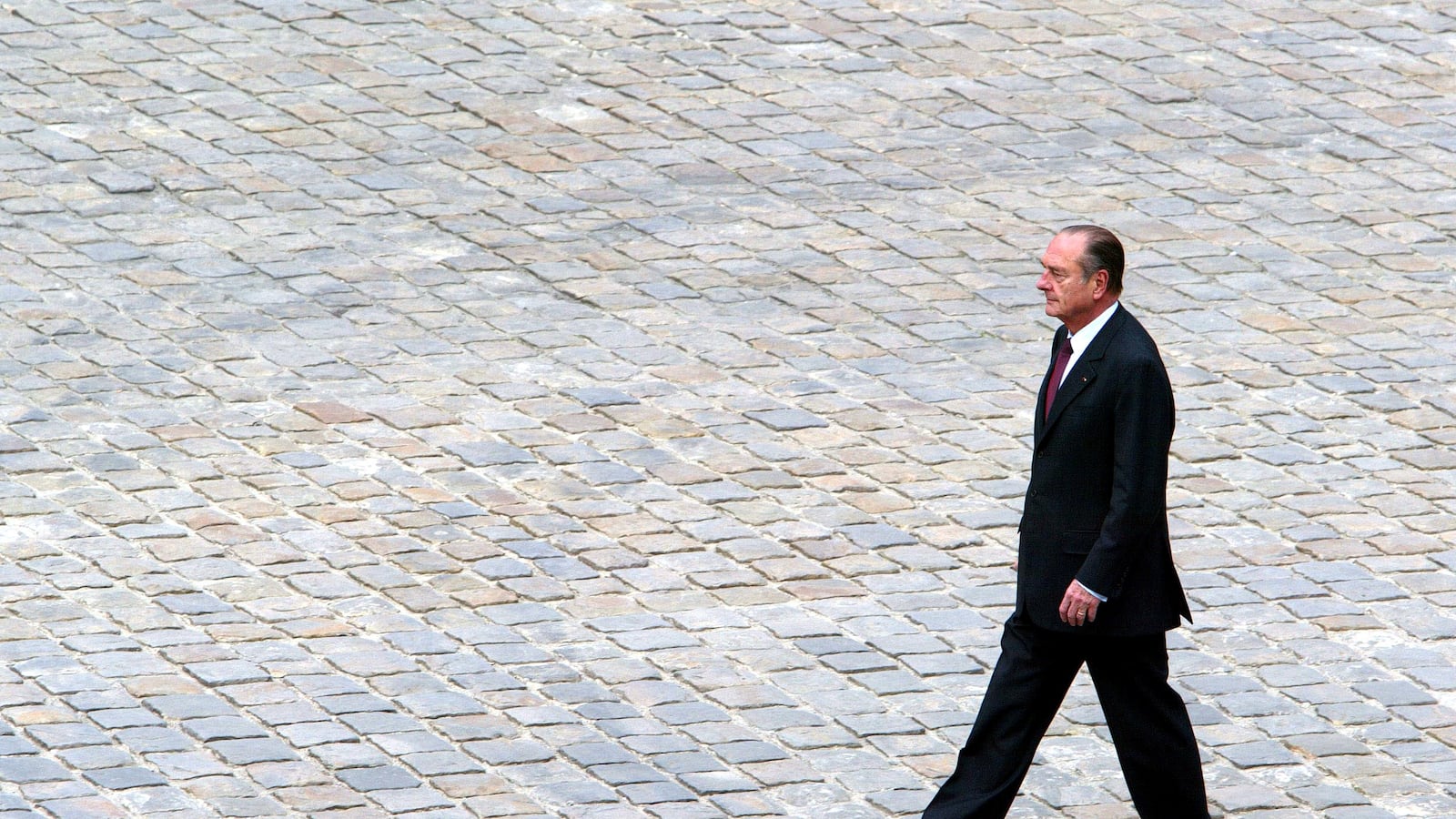PARIS—Jacques Chirac, whose family announced his death at age 86 on Thursday, was in many ways the French president with the greatest affinity for the United States, yet without question he was the one most reviled by Americans.
His offense? In 2003 he tried to keep the George W. Bush administration from going to war in Iraq, working to thwart the endorsement of the United Nations Security Council and publicly rejecting Washington’s attempts to build a “coalition of the willing” to take down dictator Saddam Hussein.
Chirac when he was young had studied at Harvard and worked behind the counter scooping ice cream at a Howard Johnson’s roadside restaurant in Massachusetts. He spoke passable if largely unpracticed English, and was so tall and lanky and seemingly simple in his manner that he reminded some of his fans of Hollywood’s Gary Cooper. He started his career representing the rural constituency of Corrèze and could come across as both very sincere and rather naïve, sort of “Mr. Deeds Goes to Paris.”
But Chirac’s attempts to prevent the American invasion of Iraq led to an outburst of hysterical francophobia in the States. “French fries” were renamed “freedom fries,” Bordeaux and Burgundy got poured down various drains, and as plonk coursed through the sewers critics on the Web borrowed a line from The Simpsons: The French, they said, were “cheese eating surrender monkeys.”
How silly. And in retrospect, how truly contemptible. Chirac had been all too right in trying to stand against the launch of what amounted to a colonial war, the kind France fought and lost in Algeria when he served in the military. Bush’s “Operation Iraqi Freedom” became the Forever War and Bush’s post-9/11 Global War on Terror led to an exponential spread of terrorism.
This is what Chirac had predicted, and it was something nobody understood better than the Iraqis themselves. In the autumn of 2003 a poll asking them which world leader they admired most—presumably commissioned in the expectation W would top the list—showed in fact they they favored, by far, Jacques Chirac.
As a politician, Chirac had many flaws and any number of questionable or corrupt connections. In his dotage, he was convicted on corruption charges from his time as mayor of Paris and drew a two-year suspended sentence. His dealings with former French colonies in Africa and some of the players in the Middle East, including Iraqi tyrant Saddam Hussein, were far from transparent. (Note: until Saddam invaded Kuwait in 1990, Washington was leading the rush to embrace him.)
But whatever Chirac’s failings, in addition to his determination and bravery in the tumult of 2003, here’s what I remember.
He was the first elected mayor of Paris, and under his administration in the '80s the City of Lights was resplendent. The parks were pristine. The monuments glistened. As the bicentennial of the French Revolution approached in 1989, statues and domes like that of Les Invalides, which had long been dull and green, were covered again with gold leaf. Proud of the accomplishment, Chirac put a plexiglass coffee table in his mayoral office filled with some of the leftover gold, like a brilliant pile of autumn leaves. Once when I interviewed him there, he seemed to take a kind of childish pleasure in its extravagance, and its beauty.
Today, by comparison, Paris is more open to the people. We picnic on lawns in the parks that once were strictly off limits. Meanwhile bike lanes are squeezing the city streets, and cars really are not welcome. Tents on city sidewalks shelter the homeless, making even some affluent neighborhoods look like campgrounds. Such measures have their environmental and humanistic virtues, to be sure, but the most-loved city in the world no longer shines the way it did under Chirac.
He also stood in marked contrast to the president who came before him.
The Socialist François Mitterrand, in office from 1981 to 1995, was known as “The Sphinx,” a sobriquet reflecting his reputation as a Machiavellian maestro in a nation where palace intrigues have been the stuff of legend and a way of life since the first days of the ancien régime.
In the early '90s, at the height of the Balkan wars, Mitterrand deployed French troops with the ostensible purpose of keeping the peace, or at least curtailing the slaughter. They did neither, but their presence was used by Mitterrand to avoid any further international intervention that might actually have forced an end to the wars. Under the guise of humanitarian action, as Sarajevo suffered under a terrible siege, Mitterrand was supporting in effect the savage Serbian and Bosnian Serb military.
When Chirac was elected president in 1995, he and U.S. President Bill Clinton moved quickly to end the Balkan stalemate, backing a Croatian offensive that set the Serbs back on their heels and forced them to the peace table.
I’ll leave it to others to recount the vicissitudes of Chirac’s career maneuvering among the long knives of his colleagues as well as his adversaries in French politics. But as someone who has lived here for a long time, and also covered many wars, I think of him as the kind of man I’d like to share a beer with, the kind of mayor who respected the power of beauty, and the kind of statesman who understood the costs of war.





